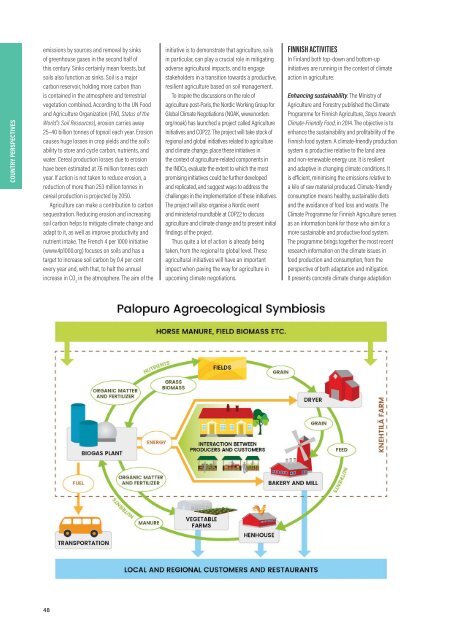Climate Action 2016-2017
Create successful ePaper yourself
Turn your PDF publications into a flip-book with our unique Google optimized e-Paper software.
COUNTRY PERSPECTIVES<br />
emissions by sources and removal by sinks<br />
of greenhouse gases in the second half of<br />
this century. Sinks certainly mean forests, but<br />
soils also function as sinks. Soil is a major<br />
carbon reservoir, holding more carbon than<br />
is contained in the atmosphere and terrestrial<br />
vegetation combined. According to the UN Food<br />
and Agriculture Organization (FAO, Status of the<br />
World’s Soil Resources), erosion carries away<br />
25–40 billion tonnes of topsoil each year. Erosion<br />
causes huge losses in crop yields and the soil’s<br />
ability to store and cycle carbon, nutrients, and<br />
water. Cereal production losses due to erosion<br />
have been estimated at 7.6 million tonnes each<br />
year. If action is not taken to reduce erosion, a<br />
reduction of more than 253 million tonnes in<br />
cereal production is projected by 2050.<br />
Agriculture can make a contribution to carbon<br />
sequestration. Reducing erosion and increasing<br />
soil carbon helps to mitigate climate change and<br />
adapt to it, as well as improve productivity and<br />
nutrient intake. The French 4 per 1000 initiative<br />
(www.4p1000.org) focuses on soils and has a<br />
target to increase soil carbon by 0.4 per cent<br />
every year and, with that, to halt the annual<br />
increase in CO 2<br />
in the atmosphere. The aim of the<br />
initiative is to demonstrate that agriculture, soils<br />
in particular, can play a crucial role in mitigating<br />
adverse agricultural impacts, and to engage<br />
stakeholders in a transition towards a productive,<br />
resilient agriculture based on soil management.<br />
To inspire the discussions on the role of<br />
agriculture post-Paris, the Nordic Working Group for<br />
Global <strong>Climate</strong> Negotiations (NOAK, www.norden.<br />
org/noak) has launched a project called Agriculture<br />
Initiatives and COP22. The project will take stock of<br />
regional and global initiatives related to agriculture<br />
and climate change, place these initiatives in<br />
the context of agriculture-related components in<br />
the INDCs, evaluate the extent to which the most<br />
promising initiatives could be further developed<br />
and replicated, and suggest ways to address the<br />
challenges in the implementation of these initiatives.<br />
The project will also organise a Nordic event<br />
and ministerial roundtable at COP22 to discuss<br />
agriculture and climate change and to present initial<br />
findings of the project.<br />
Thus quite a lot of action is already being<br />
taken, from the regional to global level. These<br />
agricultural initiatives will have an important<br />
impact when paving the way for agriculture in<br />
upcoming climate negotiations.<br />
FINNISH ACTIVITIES<br />
In Finland both top-down and bottom-up<br />
initiatives are running in the context of climate<br />
action in agriculture:<br />
Enhancing sustainability. The Ministry of<br />
Agriculture and Forestry published the <strong>Climate</strong><br />
Programme for Finnish Agriculture, Steps towards<br />
<strong>Climate</strong>-Friendly Food, in 2014. The objective is to<br />
enhance the sustainability and profitability of the<br />
Finnish food system. A climate-friendly production<br />
system is productive relative to the land area<br />
and non-renewable energy use. It is resilient<br />
and adaptive in changing climate conditions. It<br />
is efficient, minimising the emissions relative to<br />
a kilo of raw material produced. <strong>Climate</strong>-friendly<br />
consumption means healthy, sustainable diets<br />
and the avoidance of food loss and waste. The<br />
<strong>Climate</strong> Programme for Finnish Agriculture serves<br />
as an information bank for those who aim for a<br />
more sustainable and productive food system.<br />
The programme brings together the most recent<br />
research information on the climate issues in<br />
food production and consumption, from the<br />
perspective of both adaptation and mitigation.<br />
It presents concrete climate change adaptation<br />
48












